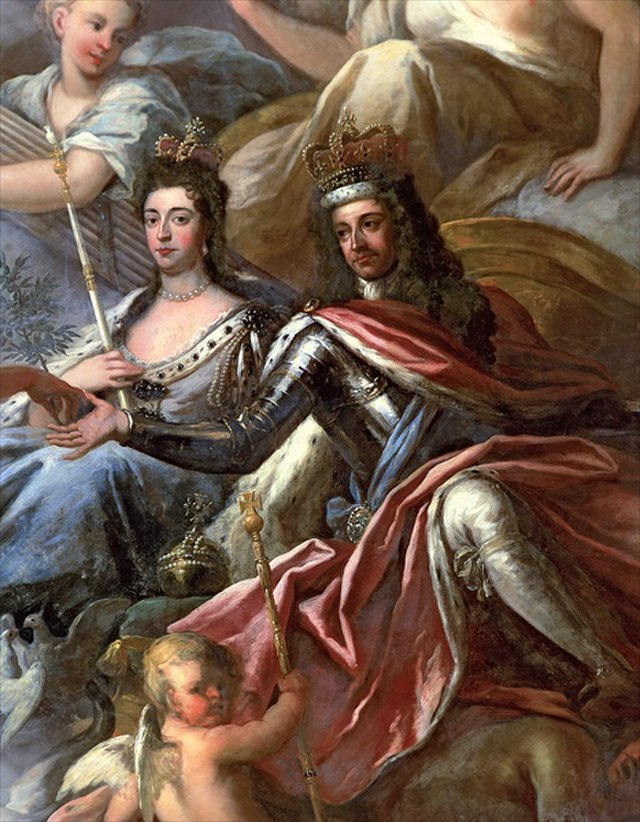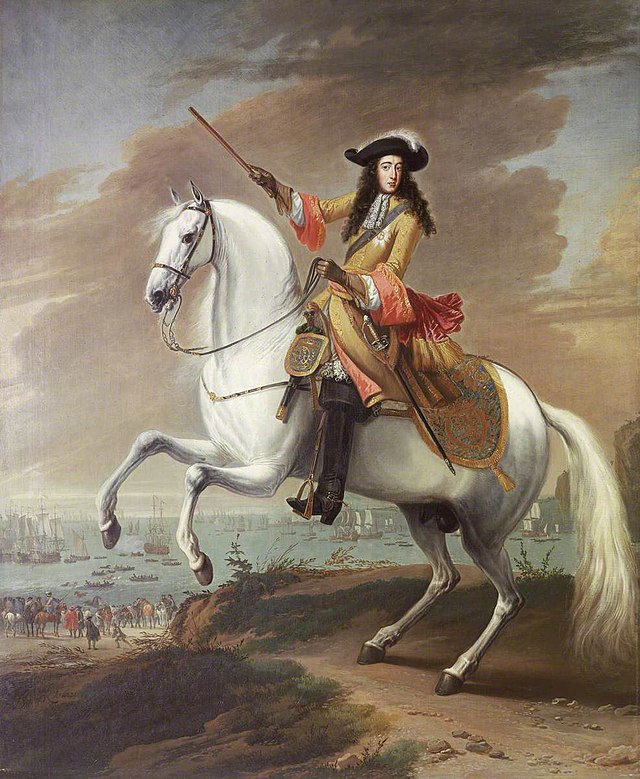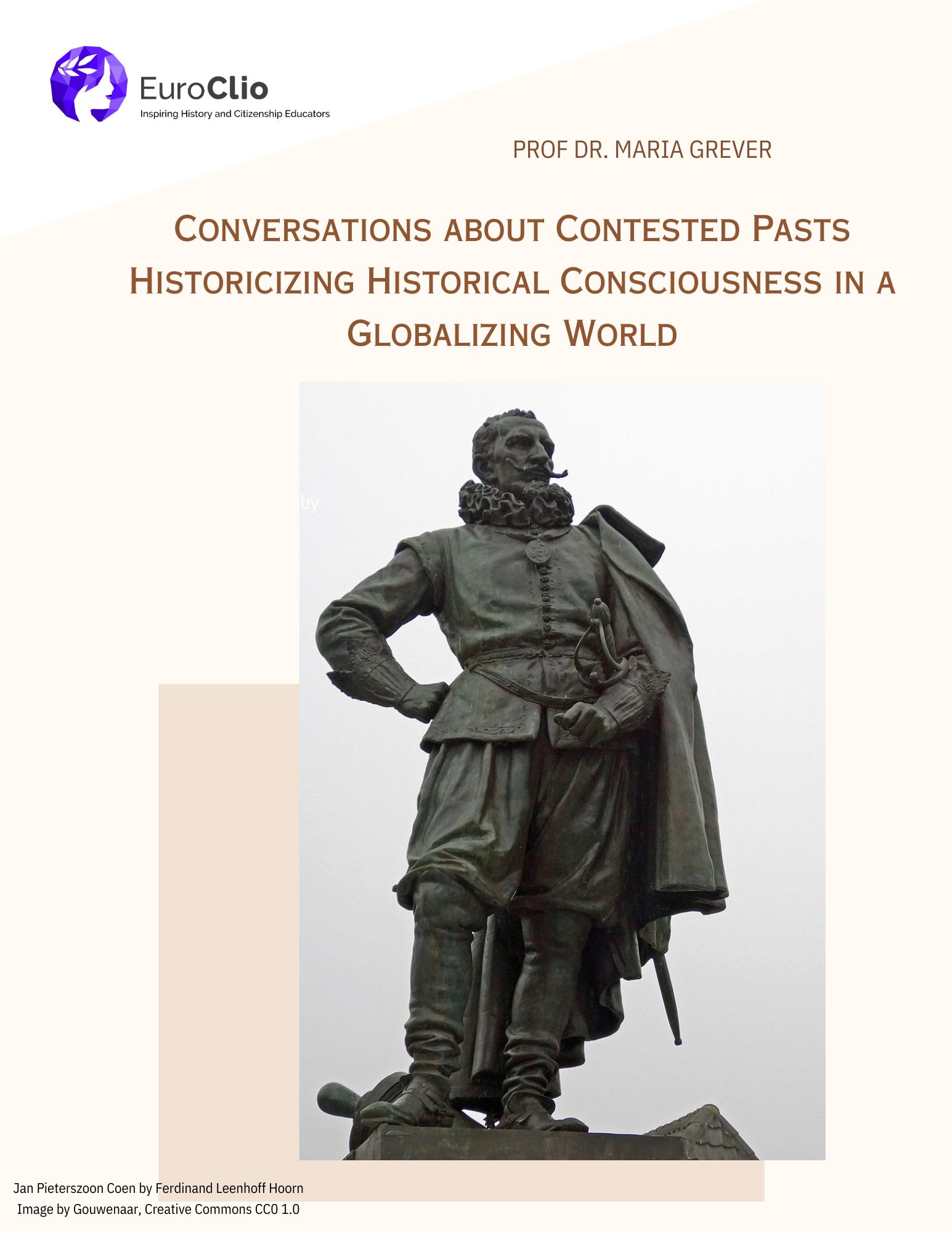
Introduction
Most history textbooks portray the Glorious Revolution as a harmonious event where William of Orange is persuaded to come and rescue Great Britain from reverting back to Catholicism under the absolutist-style regime of King James II. The “glorious aspect” of this so-called revolution is the relatively peaceful transfer of power from the monarch to Parliament that ensues after William and his wife Mary, the eldest daughter of James II, are “invited” to jointly rule England and its empire. However, many scholars share an alternate interpretation of the events of 1688-90 and conversely view the ascension of William of Orange to the British throne as a “Dutch invasion” motivated by realpolitik and a personal lust for power.
Learning Objectives
This lesson could be done several ways depending on how much time you have and your student audience. It is a good way to introduce students to different ways of interpreting an historical event. Many at the time and historians through today have portrayed the Glorious Revolution as a triumph for the English monarchy, constitutional government and Church of England. However, not everyone then or today viewed it this way. William was not English but Dutch and he invaded England in order to take power (a group in Parliament invited him to do so).
Students could use some or all of the provided video, secondary and primary source resources to analyze different views of The Glorious Revolution. You could have them summarize and explain each one in their own words, working individually or in small groups. You could also have them write an essay using the primary source documents. Another idea would be to split your class into two groups and have a debate on whether or not The Glorious Revolution was a glorious and great series of events, or a Dutch invasion that suppressed Catholics and those opposed to the monarchy.
YouTube Video Resources
Background
The larger historical context surrounding the Glorious Revolution is complex and resplendent with high drama, wherein war, political rivalry, economic competition, and religion all play a role. William of Orange, known as Prince William in Britain, was the stadholder, or military and political leader of the Dutch Republic, a technically non-hereditary position that had been held by his family members on and off for a century. He came to power in 1672 during the Year of Disaster when the Dutch Republic was embroiled in the third Anglo-Dutch War while simultaneously facing an invasion of the Republic by Louis XIV of France, supported by the principalities of Munster and Cologne.
While William was immensely popular with half of his constituents, the Orangists, who had violently pressured the States General (the representative oligarch government of the Dutch Republic) to allow William to assume the stadholder position that had been vacant since the death of his father twenty-two years earlier, William struggled to maintain support from conservative forces within the government who resisted his style of leadership that had the appearance of a monarchy within am ostensibly republican form of government. The Treaty of Westminster of 1674 ended the third Anglo-Dutch War, and direct military conflict with the other adversaries of the Dutch Republic who resented the small nation’s economic success and political autonomy subsided, yet economic challenges remained. Louis XIV was determined to destroy the Dutch economy, and another war seemed inevitable. For William and the Republic, it was imperative that England not join ranks with the French. When presented with the gravity of the situation, William’s former detractors, many of whom were members of the States Party faction (the group that had left the stadholder position vacant) and wealthy burghers or nobles from the trade-dependent state of Holland, agreed to support William’s plan for another war with France.
Unfortunately, an English/Dutch alliance against France seemed unlikely from the onset and became impossible after the succession to the English throne changed following the birth of a son to James II and his second wife Mary of Modena. The birth of a male heir not only meant that William’s wife Mary would not now be next in line to the throne, but the new crown prince would be brought up in the household of a Catholic Queen and James II. The latter was sympathetic to Catholic toleration, was much impressed by Louise XIV’s style of absolute monarchy and was willing to work with France to reduce Dutch economic power.
William saw the English throne as his birthright and was actually in the line of succession for the British throne. His mother was the elder sister of Charles II and James II, and since James’s elder daughters were the product of a marriage to a commoner, William considered himself to be the rightful heir. Nevertheless, to ensure his position, he married the presumed heir to the throne, Mary Stuart, the eldest daughter of James II and his Protestant first wife. William’s ascension to the British throne was jeopardized by the birth of a son to James II. The fact that baby James Francis Edward Stuart was baptized as a Catholic was reason enough for the Protestant powers in Parliament to contemplate another overthrow of the Stuart dynasty. In addition, based on Mary of Modena’s previous history of having babies that did not survive infancy, rumors were circulating that the baby was not actually hers, but rather an imposter who had been smuggled in. Doubters were numerous and even included Princess Anne. Ultimately, King James II issued a public statement affirming his parentage of the newborn. However, at this point the child’s paternity was irrelevant, since plans rooted in larger political issues were in action for a serious regime change.
Secondary Sources:
- British House of Commons excerpts version of The Glorious Revolution
The Glorious Revolution is a term used to describe the peaceful way in which Parliament asserted its rights over the monarchy in 1688.
Historical Interpretations
The traditional Whig view of the Glorious Revolution is embodied in Thomas Babington Macaulay’s The History of England from the accession of James the second, 1849-61. For Macaulay the revolution was “a vindication of our ancient rights” in which it was “finally decided … whether the popular element, which had, ever since the age of Fitzwalter and de Montfort, been found in English polity, should be destroyed by the monarchical element, or should be suffered to develop itself freely and to become dominant.” Macaulay’s view was that because England had had a preserving revolution in the seventeenth century, she had been spared a destroying revolution in the nineteenth. As the contemporary philosopher John Locke had written, James II was guilty of breaking the “original contract” between sovereign and people, and had therefore suffered the just wrath of Parliament and people. The Whig view of the Glorious Revolution is therefore simply that it was a triumph for the purity of constitutional law over an outrageous attempt at its perversion, a reaffirmation of the liberties of the English people.
However, this interpretation of the Glorious Revolution has not gone unchallenged. To some twentieth century historians it has appeared as a respectable revolution, (e.g. Lucile Pinkham, William and the Respectable Revolution, 1954), involving just the ruling classes and leaving the monarchy in most respects unaltered, hardly a proper revolution at all. For example, the constitutional historian Mark Thompson wrote that apart from determining the succession, the Bill of Rights (which contained the clauses submitted for acceptance by William and Mary) did “little more than set forth certain points of existing laws and simply secured to Englishmen the rights of which they were already legally possessed”. Others have been even more dismissive: the Russian historian, Viktor F. Semenov, regarded it as a mere coup d’etat in its conservatism, its bloodlessness and its legalism.
This Marxist interpretation is given some weight by the fact that (for example) a point-by-point analysis of the Bill of Rights does reveal that in several aspects it is indeed a rather conservative document. It is a declaratory Act, reasserting ancient rights and restoring the monarchy with in Two Treatises of Government.
It is quite tempting to see the events of 1688 as a mere codicil to the interregnum, of no major importance in themselves. However, this is misleading. The civil wars cannot be regarded as finally settling England’s political future as a parliamentary monarchy. Neither, of course, can the Glorious Revolution of 1688. However, before 1688 it is possible to see England as beginning to move towards absolutism on the French model. After 1688 this is stopped. The obvious cause of the Glorious Revolution was the stupidity and impatience of James II, who not only frightened the Anglican Church and laity by his moves towards a restoration of Popery, but managed to unite a wide variety of interests in opposition to his clumsy policies. However, it must be remembered that the Prince called in to save the situation had no desire for a weakened monarchy: the agreements of 1688-89 are not, therefore, obviously radical documents. But the fact they exist at all is of great importance. Any move towards popery or absolutism was stopped. Also the Declaration and Bill of Rights restricted the King’s dispensing powers and his standing army, and insisted on the rights of a free Parliament.
One development which did result from the Glorious Revolution was the transformation by William III of England’s place in Europe and the wars that this involved, which led to a crucial loss of royal power and establishment of parliamentary supremacy. For instance the Triennial Act of 1694 required Parliaments to be summoned every three years , and thus prevented future monarchs from ruling without a parliament, a favourite practice of the Stuarts – but this is a development seen with hindsight. “Constitutional government has endured because it became a habit in the eighteenth century, not because it was established by revolution (great or small) in the seventeenth.”
- BBC History excerpts version of The Glorious Revolution
The Glorious Revolution of 1688-1689 replaced the reigning king, James II, with the joint monarchy of his protestant daughter Mary and her Dutch husband, William of Orange. It was the keystone of the Whig (those opposed to a Catholic succession) history of Britain.
According to the Whig account, the events of the revolution were bloodless and the revolution settlement established the supremacy of parliament over the crown, setting Britain on the path towards constitutional monarchy and parliamentary democracy.
But it ignores the extent to which the events of 1688 constituted a foreign invasion of England by another European power, the Dutch Republic.
Although bloodshed in England was limited, the revolution was only secured in Ireland and Scotland by force and with much loss of life.
Moreover, the British causes of the revolution were as much religious as political. Indeed, the immediate constitutional impact of the revolution settlement was minimal. Nonetheless, over the course of the reign of William III (1689-1702) society underwent significant and long-lasting changes.
To understand why James II’s most powerful subjects eventually rose up in revolt against him we need to understand the deep-seated fear of ‘popery’ in Stuart England.
‘Popery’ meant more than just a fear or hatred of Catholics and the Catholic church. It reflected a widely-held belief in an elaborate conspiracy theory, that Catholics were actively plotting the overthrow of church and state.
In their place would be established a Catholic tyranny, with England becoming merely a satellite state, under the control of an all-powerful Catholic monarch, (in the era of the Glorious Revolution, identified with Louis XIV of France). This conspiracy theory was given credibility by the existence of some genuine catholic subterfuge, most notably the Gunpowder Plot of 1605.
A new crisis of ‘popery and arbitrary government’ erupted in the late 1670s.
Public anxieties were raised by the issue of the royal succession. Charles II fathered no legitimate offspring. This meant that the crown would pass to his brother, James, Duke of York, whose conversion to Catholicism had become public knowledge in 1673.
The grave danger posed to the Protestant succession and the Anglican establishment led seven peers to write to William on 30 June 1688, pledging their support to the prince if he brought a force into England against James.
William had already begun making military preparations for an invasion of England before this letter was sent. Indeed, the letter itself mainly served a propaganda purpose, to allow the prince of Orange to present his intervention as a mercy mission.
In fact, William’s main reason for interfering in English affairs was essentially pragmatic – he wished to bring England into his war against Louis XIV’s France and a free parliament was seen as more likely to support this.
The forces that the prince of Orange amassed for his invasion were vast, the flotilla consisting of 43 men-of-war, four light frigates and 10 fireships protecting over 400 flyboats capable of carrying 21,000 soldiers. All in all, it was an armada four times the size of that launched by the Spanish in 1588.
Aided by the so-called ‘Protestant wind’ which prevented James’ navy from intercepting the Dutch fleet, William landed at Torbay, Devon, on 5 November 1688, the exact timing of his landfall neatly fitting with the anniversary of another celebrated moment when the nation was delivered from popery.
James had made military preparations for the defence of England over the summer and autumn of 1688 and his army encamped on Hounslow Heath was, at about 25,000 men, numerically larger than the force brought over by William. For the first time since the 1640s, England was faced with the prospect of civil war.
The desertions continued, with the defection of John Churchill, later Duke of Marlborough, and James’ son-in-law, the Prince of Denmark on 24 November. The final betrayal came on the king’s return to his capital on the 26 November when he discovered that his daughter, Princess Anne had also absconded to join the Orangist side.
James now announced that he was willing to agree to William’s main demand – to call a ‘free’ parliament. However, the king was now convinced that his own life was in danger and was making preparations to flee the country. Meanwhile, William’s advance upon the capital had met with some resistance – a bloody skirmish at Reading on 7 December with over 50 killed.
Before they were offered the crown, William and Mary were presented with a document called the Declaration of Rights, later enshrined in law as the Bill of Rights, which affirmed a number of constitutional principles, such as the illegality of prerogative suspending and dispensing powers, the prohibition of taxation without parliamentary consent and the need for regular parliaments.
The revolution’s legacy might be seen as negative in other ways. In Ireland and Scotland, the revolution was militarily contested and its settlements extremely politically and religiously divisive. For example, Irish Protestants disregarded the generous peace terms of the Treaty of Limerick (3 October 1691) and established a monopoly over land-ownership and political power.
The revolution also failed to limit the power of parliaments and created no body of protected constitutional law. Therefore the Septennial Act of 1716 was able to effectively undermine the terms of the 1694 Triennial Act, ushering in the lengthy rule of a Whig oligarchy.
The revolution also fostered the growth of slavery by ending the Royal African Company’s monopoly on the trade in 1698. For the non-white inhabitants of the British Atlantic empire, the Glorious Revolution represented not the broadening of freedom but the expansion of servitude.
Primary Sources
Doc. 1 – Selections from the Invitation to Prince William of Orange, June 30, 1688 (excerpts)
The following invitation was sent to the Prince of Orange by:
- Charles Talbot, Earl of Shrewsbury
- William Cavendish, Earl of Devonshire
- Thomas Osborne, Earl of Danby
- Richard Lumley, Lord Lumley
- Henry Compton, Bishop of London
- Edward Russell
- Henry Sidney
“We have great satisfaction to find by 35 [i.e. Russell] and since by Monsieur Zuylestein that Your Highness is so ready and willing to give us such assistance as they have related to us. We have great reason to believe we shall be every day in a worse condition than we are, and less able to defend ourselves, and therefore we do earnestly wish we might be so happy as to find a remedy before it be too late for us to contribute to our own deliverance. But although these be our wishes, yet we will by no means put Your Highness into any expectations which might misguide your own councils in this matter; so that the best advice we can give is to inform Your Highness truly both of the state of things here at this time and of the difficulties which appear to us.
As to the first, the people are so generally dissatisfied with the present conduct of the government in relation to their religion, liberties and properties (all which have been greatly invaded), and they are in such expectation of their prospects being daily worse, that Your Highness may be assured there are nineteen parts of twenty of the people throughout the kingdom who are desirous of a change and who, we believe, would willingly contribute to it, if they had such a protection to countenance their rising as would secure them from being destroyed before they could get to be in a posture to defend themselves. It is no less certain that much the greatest part of the nobility and gentry are as much dissatisfied, although it is not safe to speak to many of them beforehand; and there is no doubt but that some of the most considerable of them would venture themselves with Your Highness at your first landing, whose interests would be able to draw great numbers to them whenever they could protect them and the raising and drawing of men together.”
Doc. 2 – Declaration of Prince William of Orange, Oct. 10, 1688 (excerpts)
“The Declaration of His Highness William Henry, by the Grace of God, Prince of Orange, etc., of the reasons inducing him to appear in arms in the Kingdom of England, and for preserving the Protestant religion, and for restoring the laws and liberties of England, Scotland, and Ireland.
It is both certain and evident to all men, that the public peace and happiness of any state or kingdom cannot be preserved where the law, liberties, and customs, established by the lawful authority in it, are openly transgressed and annulled; more especially, where the alteration of religion is endeavoured, and that a religion, which is contrary to law, is endeavoured to be introduced; upon which those who are most immediately concerned in it are indispensably bound to endeavour to preserve and maintain the established laws, liberties, and customs, and above all the religion and worship of God that is established among them, and to take such an effectual care, that the inhabitants of the said state or kingdom may neither be deprived of their religion, nor of their civil rights; which is so much the more necessary, being the greatness and security both of kings, royal families, and of all such as are in authority, as well as the happiness of their subjects and people, depend in a most especial manner upon the exact observations and maintenance of these their laws, liberties, and customs.
It is also manifest and notorious, that as His Majesty was, upon his coming to the Crown, received and acknowledged by all the subjects of England, Scotland, and Ireland, as their King, without the least opposition, though he then made open profession of the popish religion, so he did then promise, and solemnly swear at his coronation, that he would maintain his subjects in the free enjoyment of their laws and liberties, and, in particular, that he would maintain the Church of England as it was established by law.”
Doc. 3 – Address of the Lord Mayor and the City of London to Prince William of Orange, Dec. 11, 1688
“We are taking into consideration Your Highness’s fervent zeal for the Protestant religion, manifested to the world in your many and hazardous enterprises, which it hath pleased Almighty God to bless with miraculous success, we render our deepest thanks to the Divine Majesty for the same; and beg leave to present our most humble thanks to Your Highness, particularly for your appearing in arms in this Kingdom, to carry on and perfect your glorious design to rescue England, Scotland, and Ireland from slavery and popery, and in a free parliament to establish the religion, the laws, and the liberties of these Kingdoms upon a sure and lasting foundation.”
Doc. 4 – The English Bill of Rights, 1689 (excerpts)
“And thereupon the said Lords Spiritual and Temporal and Commons, pursuant to their respective letters and elections, being now assembled in a full and free representative of this nation, taking into their most serious consideration the best means for attaining the ends aforesaid, do in the first place (as their ancestors in like case have usually done) for the vindicating and asserting their ancient rights and liberties declare:
- That the pretended power of suspending the laws or the execution of laws by regal authority without consent of Parliament is illegal;
- That the pretended power of dispensing with laws or the execution of laws by regal authority, as it hath been assumed and exercised of late, is illegal;
- That levying money for or to the use of the Crown by pretense of prerogative, without grant of Parliament, for longer time, or in other manner than the same is or shall be granted, is illegal;
- That it is the right of the subjects to petition the king, and all commitments and prosecutions for such petitioning are illegal;
- That the raising or keeping a standing army within the kingdom in time of peace, unless it be with consent of Parliament, is against law;
- That the subjects which are Protestants may have arms for their defense suitable to their conditions and as allowed by law;
- That election of members of Parliament ought to be free;
- That the freedom of speech and debates or proceedings in Parliament ought not to be impeached or questioned in any court or place out of Parliament;
- That excessive bail ought not to be required, nor excessive fines imposed, nor cruel and unusual punishments inflicted;
- That all grants and promises of fines and forfeitures of particular persons before conviction are illegal and void;
- And that for redress of all grievances, and for the amending, strengthening and preserving of the laws, Parliaments ought to be held frequently.
- And that the oaths hereafter mentioned be taken by all persons of whom the oaths have allegiance and supremacy might be required by law, instead of them; and that the said oaths of allegiance and supremacy be abrogated.
I, A.B., do sincerely promise and swear that I will be faithful and bear true allegiance to their Majesties King William and Queen Mary. So help me God.
Upon which their said Majesties did accept the crown and royal dignity of the kingdoms of England, France and Ireland, and the dominions thereunto belonging, according to the resolution and desire of the said Lords and Commons contained in the said declaration. And thereupon their Majesties were pleased that the said Lords Spiritual and Temporal and Commons, being the two Houses of Parliament, should continue to sit, and with their Majesties’ royal concurrence make effectual provision for the settlement of the religion, laws and liberties of this kingdom, so that the same for the future might not be in danger again of being subverted, to which the said Lords Spiritual and Temporal and Commons did agree, and proceed to act accordingly.”
Doc. 5 – William of Orange landing at Brixham, Torbay, Nov. 5, 1688

Wyck, Jan; William III Landing at Brixham, Torbay, 5 November 1688; National Maritime Museum;
Doc. 6 – Song: The Boyne Water
https://www.bartleby.com/lit-hub/anthology-of-irish-verse/42-the-boyne-water/
About the Author
Thomas “Tom” Quinn Marabello is a former teacher who taught secondary history/social studies for over a decade, including AP European History. He got his BA in History from Marymount University and his MA in Medieval and Early Modern European Studies from Georgetown University. While a teacher, Tom did two National Endowment for the Humanities summer study tours in Europe, was a Fulbright-Hays recipient to Bulgaria, and did graduate course work at the University of Galway in Ireland. He has done curriculum work and curated online resources for the National Council for History Education, Renaissance Society of America and the U.S. Capitol Historical Society. Tom currently works for Maritz Global Events and is a part-time guide at the President Woodrow Wilson House. He is also involved with the Swiss American Historical Society where he serves as Vice President, is on the editorial review board, and regularly writes articles for the SAHS Review. Tom lives in Washington, DC.





